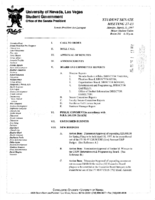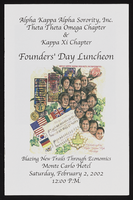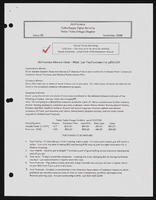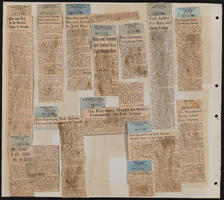Search the Special Collections and Archives Portal
Search Results

Meeting minutes for Consolidated Student Senate University of Nevada, Las Vegas, March 31, 1997
Date
Archival Collection
Description
Text

Alpha Kappa Alpha Sorority, Theta Theta Omega Chapter Founders' Day committee reports
Date
Archival Collection
Description
From the Alpha Kappa Alpha Sorority, Incorporated, Theta Theta Omega Chapter Records (MS-01014) -- Chapter records file.
Text

High Hat Regency Neon Survey document, September 6, 2017
Date
Archival Collection
Description
Site address: 1300 S Las Vegas Blvd
Sign owner: Tarighi Bahman and Farideh
Sign details: The building was constructed in 1958 (Assessor). A vintage postcard from the 1950's-- or more likely the 1960's (based upon the automobiles pictured)-- shows that the business was previously named the Chevron Motel (Las Vegas motels then and now).
Sign condition: Condition is 3-4, fair to good. The pole, cabinets and reader board are in good condition. Moderate rust is evident around the edges of the top cabinet. The paint is generally in good condition, although there white patches (from repairs?) on the chevron. The neon tubing is entirely intact. Most of the incandescent light bulbs are present, except for the underside of the lower cabinet, where they are completely absent.
Sign form: Pole Sign
Sign-specific description: A single round white metal pole supports the sign, which is cantilevered toward the street. The cabinets form a rectangular "C" which is open on the motel side. The interior of the "C" surrounds a chevron which points toward the motel. On top of the motel side of the upper cabinet is a metal top hat and cane. The sign is attached to the pole at the side of the lower cabinet, the point of the chevron and the bottom of the upper cabinet. The background color of the sign is sky blue. The bottom of the face of the lower cabinet has the word "VACANCY" painted in white sans serif letters. The letters are traced in white skeleton neon. To the left, the word "NO" is spelled out in clear skeleton neon sans serif letters. Above the neon letters is a white metal reader board which has a row of clear incandescent light bulbs running along the top, bottom and motel side edges. A single row of clear incandescent light bulbs runs the entire length of the street side of the sign. On the street side of the chevron is a blue metal cabinet with the word "MOTEL" spelled in white channel letters. The channels are outlined by white neon tubes, while the interior of the channels are filled with clear or white incandescent light bulbs. On the motel side of the "MOTEL" cabinet is a blue chevron which is covered with clear or white incandescent light bulbs. The top cabinet features the words "High Hat" spelled out in white cursive letters. Below is the word "REGENCY" painted in white sans serif letters. All wording is traced by white skeleton neon. On top of the motel side of the upper cabinet is a white top hat with a blue hat band. Running through the hat is a white cane. The hat and cane are traced by white skeleton neon. The hat is covered with white or clear incandescent light bulbs.
Sign - type of display: Neon, incandescent, reader board
Sign - media: Steel, plastic
Sign - non-neon treatments: reader board
Sign animation: Light bulbs flicker
Sign environment: Las Vegas Boulevard South, north of the Las Vegas Strip near other motels and wedding chapels.
Sign - date of installation: c.1950s
Sign - thematic influences: Elegance, sophistication, high society, boomerang/chevron, 1950's, 1960's, mid-century
Survey - research locations: Assessor's website
Survey - research notes: Connolly, D. (2012 July 21). Chevron Motel. Retrieved from https://www.flickr.com/photos/dennisconnolly5059yahoocom/7635650456 Hagopian, M. (2011 January 28). No vacancy in vintage Vegas. Retrieved https://hyperallergic.com/15738/no-vacancy- vintage-vegas/ Las Vegas motels then and now. (n.d.). Chevron Motel. Retrieved from http://stefanidrivesvegas.com/8.html RoadsideArchitecture. (n.d.). High Hat Regency Motel. Retrieved from http://www.roadarch.com/signs/nvvegas.html Seltzer, D. J. (2014 June 1). High Hat Regency Motel sign in Las Vegas [Video recording]. Retrieved from https://www.youtube.com/watch?v=-bQdw48LVrA
Survey - other remarks: A vintage postcard circa 1950's-1960's shows the Chevron Motel sign as a simple pole mounted with a reader board and two light boxes which form a "C" shape open toward the motel (Las Vegas motels then and now, n.d.). A later postcard features the same sign with a chevron in the center and a semi-circular arch which encloses a light ball above the upper cabinet (Connolly, 2012). The current sign retains the chevron, the metal frames of the light boxes and reader board (Las Vegas motels then and now, n.d.). A hat and cane have replaced the arch and light ball at the top of the sign (Las Vegas motels then and now, n.d.). The light boxes have been replaced with metal cabinets with incandescent and neon displays (Las Vegas motels then and now, n.d.). The sign is pictured in a vintage postcard circa 1950's-1960's (Las Vegas motels then and now, n.d.). At that time it advertised the Chevron Motel.
Surveyor: Mitchell Cohen
Survey - date completed: 2017-09-06
Sign keywords: Neon; Incandescent; Steel; Plastic; Reader board; Pole sign; Flickering
Text

Alpha Kappa Alpha Sorority, Theta Theta Omega Chapter AKA'nomics information sheets
Date
Archival Collection
Description
From the Alpha Kappa Alpha Sorority, Incorporated, Theta Theta Omega Chapter Records (MS-01014) -- Chapter records file.
Text
Sands Hotel Public Relations Records
Identifier
Abstract
The Sands Hotel Public Relations Records document the history of the Las Vegas casino and hotel from 1952 to 1977. It is comprised primarily of photographs, mostly 8x10 black-and-white prints, color prints, and transparencies. Most were produced by the Las Vegas News Bureau. Also included are newspaper clippings, brochures, press releases, and inter-office memos relating to the advertising and promotion department. Materials also include reels of 16mm film of the Sands opening, various shows and events including Frank Sinatra and Dean Martin's "Summit Meeting" performances with the Rat Pack, and footage from various television productions filmed at the Sands.
Archival Collection

Steve Jones and Bart Jones interview, Novermber 7, 2016: transcript
Date
Archival Collection
Description
Brothers Steve and Bart Jones live and breathe Las Vegas history. Their grandparents, Burley and Arlie Jones, arrived in Las Vegas in the nineteen-teens; their father, Herb Jones; his sister, Florence Lee Jones Cahlan, and their uncle, Cliff Jones, helped form the legal, journalistic, and water policy framework that sustains Southern Nevada today. The Jones brothers build on that foundation through their custom home-building company, Merlin Construction. In this interview, they talk about living and growing up in Las Vegas, of attending John S. Park Elementary School, of hunting in the desert, of their family's commitment to cultural and racial diversity, and of accompanying their grandfather to his business at the Ranch Market in the Westside. They share their early work experiences lifeguarding and later, dealing, at local casinos as well as second-hand memories of the Kefauver trials through the tales told by their father and uncle. Steve describes mentor Audie Coker; he explains
Text

Leonard M. Jessup interview, August 6, 2018: transcript
Date
Description
“I decided to just keep going, and I devoted my career to higher ed. I wanted to continue putting back into this system that I felt I got a lot out of. Again, repaying a debt.” What began as a passion for playing school sports would later lead Dr. Len Jessup on a path to lifelong service in the area of higher education. From his California childhood he would soon find himself across different U.S. states performing various higher education duties from professor to university president. In this interview, Jessup talks about his grandparents’ decision to emigrate from Italy to the U.S. and how grateful he feels towards his family as a result. He recalls playing baseball in college. In his eyes, being part of several sports teams helped him develop into the person he is now. He describes doing research during at the University of Arizona and speaks to what it was like moving from one university position to the next. Ultimately, his colleagues would recommend that he move to Las Vegas to
Text

Transcript of interview with Dorothy Kelsey by James M. Greene, January 20, 1975
Date
Archival Collection
Description
On January 20, 1975, collector James M. Greene interviewed housewife, Dorothy Kelsey (born May 28, 1916 in Kingman, Arizona) in her home in Nelson, Nevada. This interview covers the early days of Nelson, Searchlight, and Las Vegas, as Mrs. Kelsey offers an in-depth personal narrative on the life of a local old-timer. The interview concludes with a discussion on hotels and casinos.
Text

Transcript of interview with Mitchell A. Cobeaga by Raymond E. Frey, March 14, 1976
Date
Archival Collection
Description
On March 14, 1976 Raymond E. Frey interviewed Vice President of Nevada State Bank, Mitchell A. Cobeaga (born December 11, 1917 in Lovelock, Nevada) at Mr. Frey’s home in Las Vegas, Nevada. This interview covers early life in Nevada and the history of the Nevada State Bank. During this interview Mr. Cobeaga also discusses education in Nevada in the twenties and thirties, and Southern Nevada’s influence over the rest of the state.
Text

